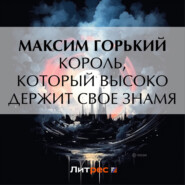По всем вопросам обращайтесь на: info@litportal.ru
(©) 2003-2024.
✖
The Man Who Was Afraid
Настройки чтения
Размер шрифта
Высота строк
Поля
“I am coming to you.”
“Come, then, come, my darling.”
Going over into auntie’s bed, he presses close to her, begging:
“Tell me something.”
“At night?” protests auntie, sleepily.
“Please.”
He does not have to ask her long. Yawning, her eyes closed, the old woman begins slowly in a voice grown heavy with sleep:
“Well, my dear sir, in a certain kingdom, in a certain empire, there lived a man and his wife, and they were very poor. They were so unfortunate that they had nothing to eat. They would go around begging, somebody would give them a crust of stale bread and that would keep them for awhile. And it came to pass that the wife begot a child – a child was born – it was necessary to christen it, but, being poor, they could not entertain the godparents and the guests, so nobody came to christen the child. They tried this and they tried that – yet nobody came. And they began to pray to the Lord, ‘Oh Lord! Oh Lord!’”
Foma knew this awful story about God’s godchild. He had heard it more than once and was already picturing to himself this godchild riding on a white horse to his godfather and godmother; he was riding in the darkness, over the desert, and he saw there all the unbearable miseries to which sinners are condemned. And he heard their faint moans and requests:
“Oh! Man! Ask the Lord yet how long are we to suffer here!”
Then it appeared to Foma that it was he who was riding at night on the white horse, and that the moans and the implorings were addressed to him. His heart contracts with some incomprehensible desire; sorrow compressed his breast and tears gathered in his eyes, which he had firmly closed and now feared to open.
He is tossing about in his bed restlessly.
“Sleep, my child. Christ be with you!” says the old woman, interrupting her tale of men suffering for their sins.
But in the morning after such a night Foma rose sound and cheerful, washed himself hastily, drank his tea in haste and ran off to school, provided with sweet cakes, which were awaited by the always hungry little Yozhov, who greedily subsisted on his rich friend’s generosity.
“Got anything to eat?” he accosted Foma, turning up his sharp-pointed nose. “Let me have it, for I left the house without eating anything. I slept too long, devil take it! I studied up to two o’clock last night. Have you solved your problems?”
“No, I haven’t.”
“Eh, you lazy bones! Well, I’ll dash them off for you directly!”
Driving his small, thin teeth into the cakes, he purred something like a kitten, stamped his left foot, beating time, and at the same time solved the problem, rattling off short phrases to Foma:
“See? Eight bucketfuls leaked out in one hour. And how many hours did it leak – six? Eh, what good things they eat in your house! Consequently, we must multiply six by eight. Do you like cake with green onions? Oh, how I like it! So that in six hours forty-eight bucketfuls leaked out of the first gauge-cock. And altogether the tub contained ninety. Do you understand the rest?”
Foma liked Yozhov better than Smolin, but he was more friendly with Smolin. He wondered at the ability and the sprightliness of the little fellow. He saw that Yozhov was more clever and better than himself; he envied him, and felt offended on that account, and at the same time he pitied him with the condescending compassion of a satisfied man for a hungry one. Perhaps it was this very compassion that prevented him from preferring this bright boy to the boring red-headed Smolin. Yozhov, fond of having a laugh at the expense of his well-fed friends, told them quite often: “Eh, you are little trunks full of cakes!”
Foma was angry with him for his sneers, and one day, touched to the quick, said wickedly and with contempt:
“And you are a beggar – a pauper!”
Yozhov’s yellow face became overcast, and he replied slowly:
“Very well, so be it! I shall never prompt you again – and you’ll be like a log of wood!”
And they did not speak to each other for about three days, very much to the regret of the teacher, who during these days had to give the lowest markings to the son of the esteemed Ignat Matveyich.
Yozhov knew everything: he related at school how the procurator’s chambermaid gave birth to a child, and that for this the procurator’s wife poured hot coffee over her husband; he could tell where and when it was best to catch perch; he knew how to make traps and cages for birds; he could give a detailed account of how the soldier had hanged himself in the garret of the armoury, and knew from which of the pupils’ parents the teacher had received a present that day and precisely what sort of a present it was.
The sphere of Smolin’s knowledge and interests was confined to the merchant’s mode of life, and, above all, the red-headed boy was fond of judging whether this man was richer than that, valuing and pricing their houses, their vessels and their horses. All this he knew to perfection, and spoke of it with enthusiasm.
Like Foma, he regarded Yozhov with the same condescending pity, but more as a friend and equal. Whenever Gordyeeff quarrelled with Yozhov, Smolin hastened to reconcile them, and he said to Foma one day, on their way home:
“Why do you always quarrel with Yozhov?”
“Well, why is he so self-conceited?” said Foma, angrily.
“He is proud because you never know your lessons, and he always helps you out. He is clever. And because he is poor – is he to blame for that? He can learn anything he wants to, and he will be rich, too.”
“He is like a mosquito,” said Foma, disdainfully; “he will buzz and buzz, and then of a sudden will bite.”
But there was something in the life of these boys that united them all; there were hours when the consciousness of difference in their natures and positions was entirely lost. On Sundays they all gathered at Smolin’s, and, getting up on the roof of the wing, where they had an enormous pigeon-house, they let the pigeons loose.
The beautiful, well-fed birds, ruffling their snow-white wings, darted out of the pigeon-house one by one, and, seating themselves in a row on the ridge of the roof, and, illumined by the sun, cooing, flaunted before the boys.
“Scare them!” implored Yozhov, trembling for impatience.
Smolin swung a pole with a bast-wisp fastened to its end, and whistled.
The frightened pigeons rushed into the air, filling it with the hurried flapping of their wings. And now, outlining big circles, they easily soar upwards, into the blue depths of the sky; they float higher and higher, their silver and snow-white feathers flashing. Some of them are striving to reach the dome of the skies with the light soaring of the falcon, their wings outstretched wide and almost motionless; others play, turn over in the air, now dropping downward in a snowy lump, now darting up like an arrow. Now the entire flock seems as though hanging motionless in the desert of the sky, and, growing smaller and smaller, seems to sink in it. With heads thrown back, the boys admire the birds in silence, without taking their eyes from them – their tired eyes, so radiant with calm joy, not altogether free from envying these winged creatures, which so freely took flight from earth up into the pure and calm atmosphere full of the glitter of the sun. The small group of scarcely visible dots, now mere specks in the azure of the sky, leads on the imagination of the children, and Yozhov expresses their common feeling when, in a low voice, he says thoughtfully:
“That’s the way we ought to fly, friends.”
While Foma, knowing that human souls, soaring heavenward, oftentimes assume the form of pigeons, felt in his breast the rising of a burning, powerful desire.
Unified by their joy, attentively and mutely awaiting the return of their birds from the depths of the sky, the boys, pressing close to one another, drifted far away from the breath of life, even as their pigeons were far from earth; at this moment they are merely children, knowing neither envy nor anger; free from everything, they are near to one another, they are mute, judging their feelings by the light in their eyes – and they feel as happy as the birds in the sky.
But now the pigeons come down on the roof again, and, tired out by their flight, are easily driven into the pigeon-house.
“Friends, let’s go for apples?” suggests Yozhov, the instigator of all games and adventures.
His call drives out of the children’s souls the peacefulness brought into them by the pigeons, and then, like plunderers, carefully listening for each and every sound, they steal quietly across the back yards toward the neighbouring garden. The fear of being caught is balanced by the hope of stealing with impunity. But stealing is work and dangerous work at that, and everything that is earned by your own labour is so sweet! And the more effort required to gain it, the sweeter it is. Carefully the boys climb over the fence of the garden, and, bending down, crawl toward the apple trees and, full of fright, look around vigilantly. Their hearts tremble and their throbbing slackens at the faintest rustle. They are alike afraid of being caught, and, if noticed, of being recognised, but in case they should only see them and yell at them, they would be satisfied. They would separate, each going in a different direction, and then, meeting again, their eyes aglow with joy and boldness, would laughingly tell one another how they felt when they heard some one giving chase to them, and what happened to them when they ran so quickly through the garden, as though the ground were burning under their feet.
Such invasions were more to Foma’s liking than all other adventures and games, and his behaviour during these invasions was marked with a boldness that at once astounded and angered his companions. He was intentionally careless in other people’s gardens: he spoke loud, noisily broke the branches of apple trees, and, tearing off a worm-eaten apple, threw it in the direction of the proprietor’s house. The danger of being caught in the act did not frighten him; it rather encouraged him – his eyes would turn darker, his teeth would clench, and his face would assume an expression of anger and pride.
Smolin, distorting his big mouth contemptibly, would say to him:
“You are making entirely too much fuss about yourself.”
“I am not a coward anyway!” replied Foma.
“I know that you are not a coward, but why do you boast of it? One may do a thing as well without boasting.”
Yozhov blamed him from a different point of view:
“If you thrust yourself into their hands willingly you can go to the devil! I am not your friend. They’ll catch you and bring you to your father – he wouldn’t do anything to you, while I would get such a spanking that all my bones would be skinned.”
“Come, then, come, my darling.”
Going over into auntie’s bed, he presses close to her, begging:
“Tell me something.”
“At night?” protests auntie, sleepily.
“Please.”
He does not have to ask her long. Yawning, her eyes closed, the old woman begins slowly in a voice grown heavy with sleep:
“Well, my dear sir, in a certain kingdom, in a certain empire, there lived a man and his wife, and they were very poor. They were so unfortunate that they had nothing to eat. They would go around begging, somebody would give them a crust of stale bread and that would keep them for awhile. And it came to pass that the wife begot a child – a child was born – it was necessary to christen it, but, being poor, they could not entertain the godparents and the guests, so nobody came to christen the child. They tried this and they tried that – yet nobody came. And they began to pray to the Lord, ‘Oh Lord! Oh Lord!’”
Foma knew this awful story about God’s godchild. He had heard it more than once and was already picturing to himself this godchild riding on a white horse to his godfather and godmother; he was riding in the darkness, over the desert, and he saw there all the unbearable miseries to which sinners are condemned. And he heard their faint moans and requests:
“Oh! Man! Ask the Lord yet how long are we to suffer here!”
Then it appeared to Foma that it was he who was riding at night on the white horse, and that the moans and the implorings were addressed to him. His heart contracts with some incomprehensible desire; sorrow compressed his breast and tears gathered in his eyes, which he had firmly closed and now feared to open.
He is tossing about in his bed restlessly.
“Sleep, my child. Christ be with you!” says the old woman, interrupting her tale of men suffering for their sins.
But in the morning after such a night Foma rose sound and cheerful, washed himself hastily, drank his tea in haste and ran off to school, provided with sweet cakes, which were awaited by the always hungry little Yozhov, who greedily subsisted on his rich friend’s generosity.
“Got anything to eat?” he accosted Foma, turning up his sharp-pointed nose. “Let me have it, for I left the house without eating anything. I slept too long, devil take it! I studied up to two o’clock last night. Have you solved your problems?”
“No, I haven’t.”
“Eh, you lazy bones! Well, I’ll dash them off for you directly!”
Driving his small, thin teeth into the cakes, he purred something like a kitten, stamped his left foot, beating time, and at the same time solved the problem, rattling off short phrases to Foma:
“See? Eight bucketfuls leaked out in one hour. And how many hours did it leak – six? Eh, what good things they eat in your house! Consequently, we must multiply six by eight. Do you like cake with green onions? Oh, how I like it! So that in six hours forty-eight bucketfuls leaked out of the first gauge-cock. And altogether the tub contained ninety. Do you understand the rest?”
Foma liked Yozhov better than Smolin, but he was more friendly with Smolin. He wondered at the ability and the sprightliness of the little fellow. He saw that Yozhov was more clever and better than himself; he envied him, and felt offended on that account, and at the same time he pitied him with the condescending compassion of a satisfied man for a hungry one. Perhaps it was this very compassion that prevented him from preferring this bright boy to the boring red-headed Smolin. Yozhov, fond of having a laugh at the expense of his well-fed friends, told them quite often: “Eh, you are little trunks full of cakes!”
Foma was angry with him for his sneers, and one day, touched to the quick, said wickedly and with contempt:
“And you are a beggar – a pauper!”
Yozhov’s yellow face became overcast, and he replied slowly:
“Very well, so be it! I shall never prompt you again – and you’ll be like a log of wood!”
And they did not speak to each other for about three days, very much to the regret of the teacher, who during these days had to give the lowest markings to the son of the esteemed Ignat Matveyich.
Yozhov knew everything: he related at school how the procurator’s chambermaid gave birth to a child, and that for this the procurator’s wife poured hot coffee over her husband; he could tell where and when it was best to catch perch; he knew how to make traps and cages for birds; he could give a detailed account of how the soldier had hanged himself in the garret of the armoury, and knew from which of the pupils’ parents the teacher had received a present that day and precisely what sort of a present it was.
The sphere of Smolin’s knowledge and interests was confined to the merchant’s mode of life, and, above all, the red-headed boy was fond of judging whether this man was richer than that, valuing and pricing their houses, their vessels and their horses. All this he knew to perfection, and spoke of it with enthusiasm.
Like Foma, he regarded Yozhov with the same condescending pity, but more as a friend and equal. Whenever Gordyeeff quarrelled with Yozhov, Smolin hastened to reconcile them, and he said to Foma one day, on their way home:
“Why do you always quarrel with Yozhov?”
“Well, why is he so self-conceited?” said Foma, angrily.
“He is proud because you never know your lessons, and he always helps you out. He is clever. And because he is poor – is he to blame for that? He can learn anything he wants to, and he will be rich, too.”
“He is like a mosquito,” said Foma, disdainfully; “he will buzz and buzz, and then of a sudden will bite.”
But there was something in the life of these boys that united them all; there were hours when the consciousness of difference in their natures and positions was entirely lost. On Sundays they all gathered at Smolin’s, and, getting up on the roof of the wing, where they had an enormous pigeon-house, they let the pigeons loose.
The beautiful, well-fed birds, ruffling their snow-white wings, darted out of the pigeon-house one by one, and, seating themselves in a row on the ridge of the roof, and, illumined by the sun, cooing, flaunted before the boys.
“Scare them!” implored Yozhov, trembling for impatience.
Smolin swung a pole with a bast-wisp fastened to its end, and whistled.
The frightened pigeons rushed into the air, filling it with the hurried flapping of their wings. And now, outlining big circles, they easily soar upwards, into the blue depths of the sky; they float higher and higher, their silver and snow-white feathers flashing. Some of them are striving to reach the dome of the skies with the light soaring of the falcon, their wings outstretched wide and almost motionless; others play, turn over in the air, now dropping downward in a snowy lump, now darting up like an arrow. Now the entire flock seems as though hanging motionless in the desert of the sky, and, growing smaller and smaller, seems to sink in it. With heads thrown back, the boys admire the birds in silence, without taking their eyes from them – their tired eyes, so radiant with calm joy, not altogether free from envying these winged creatures, which so freely took flight from earth up into the pure and calm atmosphere full of the glitter of the sun. The small group of scarcely visible dots, now mere specks in the azure of the sky, leads on the imagination of the children, and Yozhov expresses their common feeling when, in a low voice, he says thoughtfully:
“That’s the way we ought to fly, friends.”
While Foma, knowing that human souls, soaring heavenward, oftentimes assume the form of pigeons, felt in his breast the rising of a burning, powerful desire.
Unified by their joy, attentively and mutely awaiting the return of their birds from the depths of the sky, the boys, pressing close to one another, drifted far away from the breath of life, even as their pigeons were far from earth; at this moment they are merely children, knowing neither envy nor anger; free from everything, they are near to one another, they are mute, judging their feelings by the light in their eyes – and they feel as happy as the birds in the sky.
But now the pigeons come down on the roof again, and, tired out by their flight, are easily driven into the pigeon-house.
“Friends, let’s go for apples?” suggests Yozhov, the instigator of all games and adventures.
His call drives out of the children’s souls the peacefulness brought into them by the pigeons, and then, like plunderers, carefully listening for each and every sound, they steal quietly across the back yards toward the neighbouring garden. The fear of being caught is balanced by the hope of stealing with impunity. But stealing is work and dangerous work at that, and everything that is earned by your own labour is so sweet! And the more effort required to gain it, the sweeter it is. Carefully the boys climb over the fence of the garden, and, bending down, crawl toward the apple trees and, full of fright, look around vigilantly. Their hearts tremble and their throbbing slackens at the faintest rustle. They are alike afraid of being caught, and, if noticed, of being recognised, but in case they should only see them and yell at them, they would be satisfied. They would separate, each going in a different direction, and then, meeting again, their eyes aglow with joy and boldness, would laughingly tell one another how they felt when they heard some one giving chase to them, and what happened to them when they ran so quickly through the garden, as though the ground were burning under their feet.
Such invasions were more to Foma’s liking than all other adventures and games, and his behaviour during these invasions was marked with a boldness that at once astounded and angered his companions. He was intentionally careless in other people’s gardens: he spoke loud, noisily broke the branches of apple trees, and, tearing off a worm-eaten apple, threw it in the direction of the proprietor’s house. The danger of being caught in the act did not frighten him; it rather encouraged him – his eyes would turn darker, his teeth would clench, and his face would assume an expression of anger and pride.
Smolin, distorting his big mouth contemptibly, would say to him:
“You are making entirely too much fuss about yourself.”
“I am not a coward anyway!” replied Foma.
“I know that you are not a coward, but why do you boast of it? One may do a thing as well without boasting.”
Yozhov blamed him from a different point of view:
“If you thrust yourself into their hands willingly you can go to the devil! I am not your friend. They’ll catch you and bring you to your father – he wouldn’t do anything to you, while I would get such a spanking that all my bones would be skinned.”

















